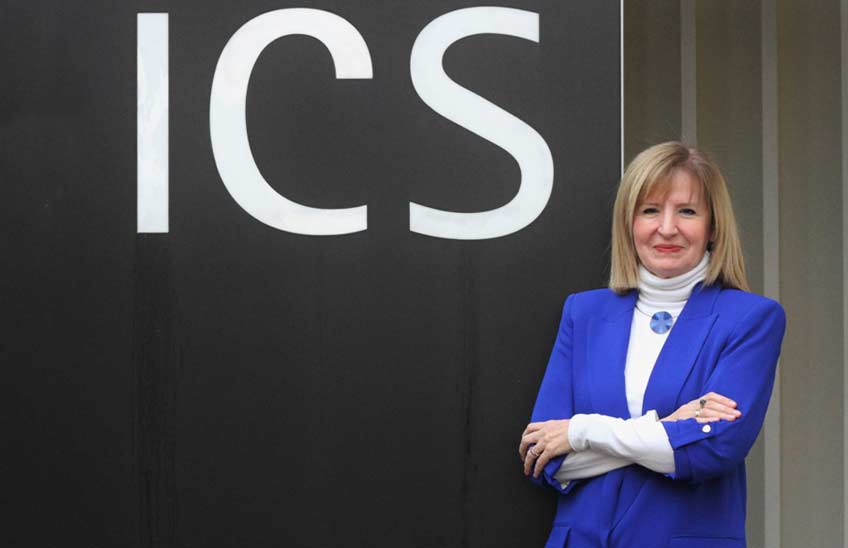"Many readers like to be fooled by fake news".
Fake news manipulates the reader through their emotions in order to modify their judgment about certain groups, explained UNED professor Laura Alba-Juez at the Institute for Culture and Society

FotoBerta Viteri<br>/Laura Alba-Juez, durante su visita al Instituto Cultura y Sociedad.
17 | 03 | 2022
Laura Alba-Juez, specialist in the analysis of speech and Professor of English Linguistics at the UNED, visited the Institute for Culture and Society University of Navarra to participate as speaker in the workshop "Vínculos y emociones en la esfera pública", organized by the group "Emotional culture and identity". In this framework, the researcher spoke about the "manipulation of emotionality in fake news" and the use of "sophisticated otherness".
-What types of fake newsexist?
First, those that are produced with mercenary or economic interests: that is, to sell something. Then, there are those that are produced with a politicaldiary : for example, to convince the audience that one political party is good and the other is bad. Finally, there is another subject of fake news with a satirical intention. In Spain, we have, for example, El Mundo Today. The fake news of the latter subject, however, is not strictly qualified as such because most definitions of fake news stress the importance of the intention to deceive.
In your work you distinguish between "raw otherness" and "sophisticated otherness", what does each consist of?
Raw otherness is when we talk about the other directly in terms such as "the other is our enemy" or "we don't like the other". We say it directly and expressly, literally. Sophisticated othering is more dangerous, because it uses inferences: it makes the readers or the audience infer things that have not been said literally. That is the danger. They are manipulating your opinion, your emotions, without you realising it. That's why it's called sophisticated; because it's more subtle. The intention is hidden.
-What is the intention behind this communicative strategy?
Sophisticated otherness constructs a narrative of two groups: us and the others. In a subtle way, sophisticated otherness makes the reader infer that one of the groups - us - is good and the other group - the others - is bad. It encourages a sense of belonging to an internal group that is opposed to an external group . You see this a lot in advertisements, in propaganda: they manipulate you by making you understand that the buyer of a specific product belongs to group of the best, of the most elegant... and so they convince you to buy that product, with this process of construction of otherness.
-Does the subtlety of sophisticated otherness succeed in producing deception more effectively?
Sophisticated alterity is more manipulative than crude alterity. By working with implicature, leaving the reader to make his own inferences - which he does not detect are already directed by speech- he convinces himself that he has rationally positioned himself in favour of one group and against another. He believes that he has chosen a certain group or a certain product or political party by a rational process and does not realise that he has been manipulated through the mechanisms of speech.
The analysts of speech try to detect all the strategies that have been used to arouse these emotions and to achieve this manipulation of evaluation: the concealment of the speaker, the attribution of statements to others, prosody, the use of semantics... These strategies can be used to send a message of negative criticism of a group but without being explicit: in other words, to manipulate the reader to stimulate specific emotions and thus also to influence their position in favour of or against a group.
-Can we do anything to avoid falling into these delusions?
Daniel Kahneman speaks of two systems of thought: the fast system - more instinctive, more automatic - and the slow system - more rational, more analytical. Slow thinking is the one that stops to check whether something is true or false, whether statements are based on something rational or not. We often let ourselves be guided by fast thinking and do not use this slower, more analytical thinking: this happens with fake news.
There has always been fake news, that's not new. The thing is that now they spread very quickly through social networks. We see a sensationalist headline, with a lie or a average truth, and we click: we fall for the clickbait. Within a minute, millions of people read that fake news. Not only do they read it, they share it. This happens because we let ourselves be guided by this fast thinking system without using slow thinking. In the past, fake news was spread by word of mouth but it didn't get that far. Now they spread very easily. That is the big problem of our time.
-Does each of us contribute to this triumph of fake news?
There are many strategies to manipulate through speech and media making use of them. But we must also bear in mind that there are many readers who like to be deceived and want to be deceived. Simply to confirm what they already believe without having made a truly rational finding: this is called "confirmation bias". News that does not confirm the previous belief is ignored.
The problem these days is that right now anyone has a say in anything topic. It's not bad that we can all communicate through social networks, but it's not right to take anyone as an expert. Someone who is not an expert should be given a platform. Experts are people who have studied an issue in depth; they are not influencers. They may have the platform of speech but not the expertise.
